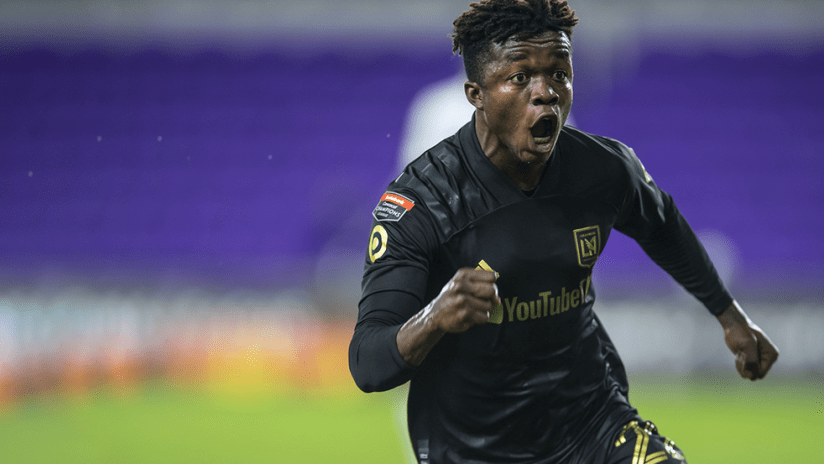With the score tied and the second-half seconds ticking down on Wednesday’s Concacaf Champions League quarterfinal clash against Cruz Azul, LAFC needed a goal.
Yet the first substitute that head coach Bob Bradley called off his bench at Exploria Stadium wasn’t Brian Rodriguez, their $11 million Uruguayan international, or usual starter Latif Blessing, or any of the club’s highly-rated Homegrown youngsters. It was Kwadwo “Mahala” Opoku, LAFC's unheralded 19-year-old Ghanaian signed in October with minimal fanfare, who was given roughly a half-hour to hunt down the decisive moment that would save MLS’s sole survivor in continental competition.
Sure enough, as most viewers scrambled to get a bead on who this teenager even was, he delivered, lashing home a technically-demanding half-volley in the 71st minute to win the game, 2-1, and advance LAFC to a juicy CCL semifinal matchup with Club America, one of the hemisphere's biggest clubs.
World, meet Mahala.
“Everybody's really excited for Mahala,” said Bradley postgame. “He's a young player who has established himself in the group. He's really well-liked, he's a player that has earned respect with the way he trains and with just having a positive personality. Everybody inside the locker room was excited for him to get his first goal and make it a game-winner and get us into the semifinals against Club America.”
While he first joined the squad way back in preseason, it was only the fifth LAFC appearance for Opoku across all competitions. He joined the Black & Gold from an academy founded in Accra 10 years ago by former Ghana international Godwin Attram and retired Dutch coach Piet de Visser, a longtime scout for Chelsea FC and a known confidante of the Blues’ oligarch owner Roman Abramovich.
Bradley himself visited the Attram De Visser Soccer Academy a year ago, the prelude to Mahala’s arrival in Los Angeles and a long-term relationship with LAFC that may yet reap further rewards.
“We continue to try to do the best job we can finding young talent,” said Bradley on Wednesday. “We've done a really good job finding some top players from South America. I think our academy’s producing players, but we've [also] worked to establish some contacts in Africa.
“Piet de Visser and Godwin Attram, it's a small academy. I had an incredible time a year ago in December – I was down there for five or six days – seeing what they were doing, seeing all these boys, smiles when they step on the field, how much they love the game. That part of football in Africa is incredibly special.”
Bradley got a taste of those cultures while leading the US men’s national team at the 2010 World Cup, then was immersed during his stint as manager of Egypt's national team from 2011-13. He’s seen the spirit, commitment and flair Blessing has brought to his side. And he wants more of it.
“I’ve been fortunate that I've had incredible experiences in the game in Africa,” Bradley said, “obviously the World Cup in South Africa, but then when I was in Egypt, some of the games, the travel in different countries, seeing what the game looks like in all these places, seeing the kids whose eyes light up when they're around football. And I have such respect for Piet and Godwin and I loved being there with them, seeing the boys. And through that, Mahala was a boy that we talked about, and we were able to get him to LAFC.”
The idea behind ADVSA is not new. African players and teams have been grabbing the global spotlight for more than a quarter-century, making the continent one of the sport’s most heavily-scouted talent hotbeds. Relative to that, MLS has been a fringe player in this domain for most of its history. So it’s fascinating to consider the prospect of a growing talent pipeline from Accra, and perhaps points beyond – the Montreal Impact’s recent signing of young Ugandan wingback Mustafa Kizza being another example.
Now, perhaps more of us will be on a first-name basis with Mahala in the coming years.
“He's got a great personality, so he's really well-liked for just what he brings every single day,” Bradley said of his effervescent new attacker. “One of the most important things when we look for players is, you want players who love to play, players who love the game. You want to create training every day so that guys show up and, man, they're excited about what's going on in training and they want to get better. And that's been the way Mahala has handled it since the day he arrived.”












